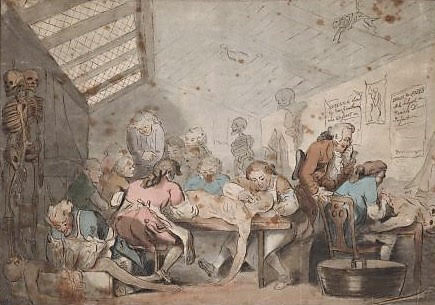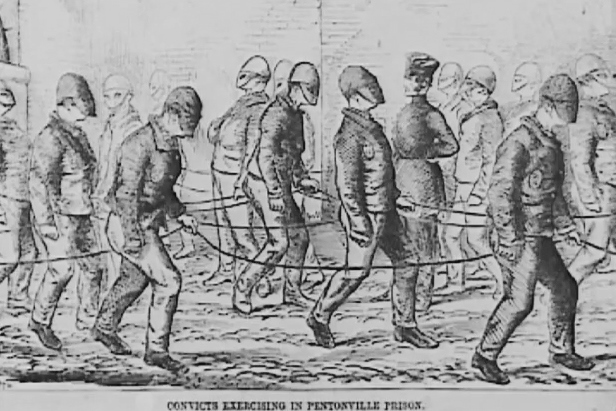Guest blog from Textor
Lena’s recent fun and games with Tory recipes is a timely reminder that class society in subtle and at times not so subtle ways betrays prejudice, arrogance and condescension. But even Poor-house Perkins and Half-pay pudding would have been treats for some when commerce and industry were beginning to put their stamp on not only the face of the city but the throats and bellies of Aberdeen’s 19th century’s poorest.
The Bible tells us The poor you will always have with you and for Aberdonians of the 1840s it must have seemed that yet again the Holy Book was spot on. Charitable giving might be a Christian duty but the Good Book seems to imply poverty could be mitigated but not abolished.

Aberdeen of the 1840s was a city of growing splendour. It boasted of its Union Street which struck westward from the heart of the old city. It proudly displayed the fruit of its burgeoning stone industry: sparkling granite buildings dotted the landscape. Town houses, commercial buildings, churches and civic grandeur all seemed to say no matter how far the city was from the capitals of Edinburgh and London, no matter how “remote” in so-called North Britain Aberdeen was a place of wealth and good taste.
Paradoxically this revolution in the built landscape was founded not on the thrusting factory system which is usually associated with early industrialisation but on a stone-working industry of hand-craft skills with steam power augmenting only a few deeply laborious processes (polishing and sawing in particular). It was the merest hint of a factory system but nonetheless value producing and profitable. If a visitor wanted to see the fruit of Aberdeen’s factory system it was not to be found in the marvels of Alexander Macdonald’s granite yard on Constitution Street but in the large buildings in the Green, at Broadford and by the River Don at Woodside. There you would find textile mills.


Where granite yards and quarries might have multiples of dozens employed (all men and boys) textile mills gave work to women, children and men by the thousands with much of their labour dictated by the turns of water wheels and the drive of steam. But as fundamental as these were in determining the rhythms of daily work and the sheer exhaustion of what could be a fourteen-hour day in hot, noisy and dusty workshops “hands” also faced the uncertainties of business cycles. A worker at any of the mills might end a day’s labour overcome by fatigue knowing that the following day meant more of the same but had the “satisfaction” of drawing a day’s wage; just about enough to keep absolute destitution at bay. In the hardest of times even a day’s wage was not be enough to keep hunger from the door – as state of affairs replicated in the 21st century with its so-called gig economy. Back in the 19th century years of poor harvests and the seasonal impact of winter deepened poverty by pushing up the price of meal beyond the pockets of labourers.
Food Banks are the current charitable response to poverty; the 19th century equivalent was the soup kitchen. Established half a century earlier soup kitchens came into their own in 1847-48 when thousands in Aberdeen suffered absolute destitution. First opened in 1799-1800 in St Mary’s Chapel, part of St Nicholas Kirk, for some six months a soup kitchen provided something like 51,000 portions of beef broth and bread. The following year demand was even greater. Admittance was by ticket and those poor lucky enough to get a ticket were charged one penny per serving. As many as 600 per day sat down for what would have been their only meal of the day.
For some thirty years the seasonal kitchen regularly opened at the Chapel, eventually moving to the area of the Vennel, and on to Loch Street where many of Aberdeen’s poorest lived. Having raised enough money in 1894 for a brand-new building the Kitchen remained at the Loch street site for about one hundred years.
But back to the plight of thousands in 1847, a time when the menace of Chartism and radicalism appeared to threaten the very existence of Victoria’s Britain. This was a time authorities feared the strength of discontent would be harnessed by and coalesce under the banner of working class democracy. When the projected Aberdeen railway ran out of cash labourers working on it were thrown out of work and they and supporters, about 200 people, gathered on the south side of the Dee then marched on the Town House where they commenced yelling and causing considerable disturbance. Magistrates hurried to reassure them that they had spoken to grain merchants and were assured that they would not seek to profit from high prices by exporting grain from the city except where they were by law bound to fulfil.
Grain supplied basic and essential food for the poor in the form of bread but grain merchants had no interest in human need only human greed and sold their grain to the highest bidder and stored it until shortages raised its price. If grain could command higher prices outside the city then they would export it.
Of course the railway’s Irish and Highland navvies well knew the practices of grain merchants and refused to be placated. As the Aberdeen Journal reported In the course of the afternoon the crowd attacked some carts on their way to the Quay, and one of the principal ringleaders, while in the act of cutting one of the sacks and rolling it from the cart, was taken prisoner by Mr Barclay, of the police, and lodged in prison. Railway navvies were not alone in suffering the pangs of hunger. Across Aberdeen thousands in and out of work were forced to resort to public charity. Two kitchens were opened; the main one in Loch Street and another in the east end where soup, bread and coffee were sold. In one six-day week in February 1847 over 6,500 meals were served. Local textile magnet Gavin Hadden feeling something like sympathy for his workers proposed a third kitchen be opened near the city centre as it was problematic for his workers to find time in the “dinner hour” to travel far afield for sustenance. His charity did not extend to paying enough to keep them from the Soup Kitchen.
Further afield, and more charitably, Milne, Cruden & Co of Gordon Mills, outside the city boundary at Woodside, decided to open their own soup kitchen. As a voice of the city’s elite the editor of the Journal hoped that the kindness and attention of the employer have produced increased gratitude and fidelity on the part of the employed.
But things got harder for operatives as financial crisis hit. Women,children and men were put on short hours. Wages collapsed and yet more soup kitchens were opened. By April even with the worst of the winter passed Bannermill works in Aberdeen opened its own canteen and once again the local newspaper editor extolled the charitable virtues of the employer: when the factory bell rings, 600 to 700 of the servants . . . find a warm and comfortable breakfast or dinner ready for them . . . a kindness, on the part of the employer, which we trust they duly appreciate. What would the workers have done without this kindness?
One Factory Inspector was much taken by the utility and efficiency of the canteen, reported that normally workers struggled to make ends meet: provisions . . . consisting very often of nothing else than a piece of dry oat cake. Having no house to go to, and no means of getting a more nourishing diet, the poor people subjected to this state of matters suffered much in bodily health and strength, being often quite exhausted before the labours of the day were over. These consequences, so injurious to the employers and employed, have to a great extent been obviated by the plan which has been happily fallen upon in these northern factories. With pressure of time within the factory and the need to keep production flowing the kitchen could serve, Inspector Walker said, 400 meals in twenty minutes. And then it was back to the grind.
No matter how fast meals were served the kindness so-called was brought to a halt as the crisis in the textile industry deepened. Factory canteens were a viable response – viable in employers’ terms – only so long as some kind of profit could be ground from the workforce and available markets. But when mills closed, canteens closed. Unemployment burgeoned. Two new charities were established: Aberdeen Operatives and Labourer’s Fund and Woodside and Neighbourhood Fund.
1848 dawned for thousands with no prospect of things improving. Across Europe revolution threatened. On the 10 March hundreds suffering, it was said, starvation gathered at the Castlegate. Knowing of recent major disturbances in Glasgow Aberdeen’s magistrates decided to take no chances. Property needed protecting. Eight hundred special constables were enrolled. In the event “order reigned in Aberdeen”. Some charitable help was doled out but it still left the problem of how to keep the peace with so many thousands suffering. How to keep the loyalty of the poor, employed and unemployed.
Woodside ministers of the Established and Free Churches came forward and asked that the canteen at Grandholm mills, shut when work ceased, be made available. These kirk men offered a stark view of Woodside’s communities: upwards of two thousand persons have been deprived of all means of subsistence and this being disastrous more especially to the numerous helpless females at Grandholm, there is no other prospect, but the extremity of destitution . . . famine and its concomitants, disease and death, must stalk through our streets. The starving of Woodside were hit, it was claimed, harder than those of the city to the extent that there was only a small wealthy middle class locally. Most shopkeepers and merchants of the area relied upon the earnings of the textile workers so when they were thrown out of work everyone suffered.
In Aberdeen itself suffering continued. A meeting of close to 1,000 unemployed women and men complained of the soup kitchens failing to meet their needs. Kitchens ran out of soup, tickets which were necessary to gain admittance were, they said, being given to undeserving cases who were themselves drawing on the meagre dole of the Poor Law. Those administering the charities no doubt all with full-bellies decided that the bona-fides of applicants would no longer need the signature of a past employer but all – all! that was needed was the signatures of two respectable householders. One Council member spoke of fearful destitution and misery in the city and gave voice to concern of the threat of revolution. Westminster he said needed to act more especially at a time when there is great political excitement abroad, and when the distress in which they are plunged may make them susceptible of impressions, not calculated by any means to advance the peace of society.
The coming of summer saw no improvement. At Woodside “deserving” cases were being given a daily pound of meal but only after strict enquiry into the circumstances of the applicants. Meanwhile in Aberdeen the kitchens were doling out over 1,000 portions per day. This continued into autumn by which time it was costing as much as £100 per week to finance the Aberdeen fund, with a running total bill of £1540 in mid-October against receipts of £1,380. Managers of the fund were at a loss, the more they collected the more was required and they conceded that not only was debt increasing, but there was upwards of a thousand persons unprovided for on the roll; deserving men and women and children who could not be fed.
Winter meant the probability of hard weather, the ending of any casual agricultural work, restricted supplies of fresh vegetables, local fishing became uncertain – dire prospects which faced thousands of the local population already suffering from weakened physical condition. Such was the state of male labourers at the time, that is men who were fortunate enough to be given permission to draw on the kitchens, that the managers of the unemployed fund recognised weakness and debility now stalked the workforce, meaning potential labourers were incapable of any strenuous work, that even if the languishing Aberdeen Railway was restarted there were not half a dozen of these poor people fit for labour.

Seeing no end to the call for charity fund managers proposed, and it does sound so contemporary, that any males so benefiting should be expected to give something in return – this, said Ballie Nicol, had the double advantage of getting work out of the destitute and at the same time deterring “lazy” poor from trying to get something for nothing. And yet another of our contemporary tropes is found among 19th century free-market liberals when it was proposed that the local state might become a major employer. Provost Thompson said that the principle of any community or government providing employment for the people is a bad one, and that we must revert to the principle of using our funds merely for the purpose of preventing starvation, and giving the smallest amount of assistance compatible with bodily support, and by giving it purely as charity. In the midst of such a bleak economy Provost Thompson was, dear reader, able to greet Queen Victoria’s and Albert’s arrival in the Aberdeen in September when he presented her with silver keys to the city. A right Royal Circus at one side of town and bread at the soup kitchen if they were ‘lucky’ for unemployed starving women, men and children at the other.

There was no revolution. Unemployment and poverty remained hallmarks of the system. Crises pass albeit at the expense of life and hopes of individuals, families and whole communities. By 1849 British capital was entering a period of growth and greater stability as institutions evolved to cope with the forces of the free market.
Loch Street Soup Kitchen? The building still stands; a reminder to present-day food banks that what was, is.
 I didn’t warm to his style immediately. I found it too spare and his protagonist Mrs Scott a little too glaikit and too far gone for a woman of just seventy; a country woman who didn’t know the names of flowers and birds is completely unbelievable – but Crichton Smith’s character grows in awareness throughout the book, driven by circumstance, to question everything she believed in. By the end of the book I was impressed. The simplicity of the tale’s beginning transformed into a rigorous exploration of the deceit and corruption that produced one of the greatest atrocities, arguably the greatest atrocity, to take place in these islands. An atrocity of monumental proportions that has been deliberately under-exposed by generations of historians happily complicit and driven by their own prejudices to sugar-coat the eviction and transportation of tens of thousands of Scots Highlanders from their homes and country – penniless and traumatised to uncertain futures abroad. These apologists are still around – on our radios and televisions – dismissing the Clearances as not so bad – in fact they were the making of the Highlander several claim.
I didn’t warm to his style immediately. I found it too spare and his protagonist Mrs Scott a little too glaikit and too far gone for a woman of just seventy; a country woman who didn’t know the names of flowers and birds is completely unbelievable – but Crichton Smith’s character grows in awareness throughout the book, driven by circumstance, to question everything she believed in. By the end of the book I was impressed. The simplicity of the tale’s beginning transformed into a rigorous exploration of the deceit and corruption that produced one of the greatest atrocities, arguably the greatest atrocity, to take place in these islands. An atrocity of monumental proportions that has been deliberately under-exposed by generations of historians happily complicit and driven by their own prejudices to sugar-coat the eviction and transportation of tens of thousands of Scots Highlanders from their homes and country – penniless and traumatised to uncertain futures abroad. These apologists are still around – on our radios and televisions – dismissing the Clearances as not so bad – in fact they were the making of the Highlander several claim.










































